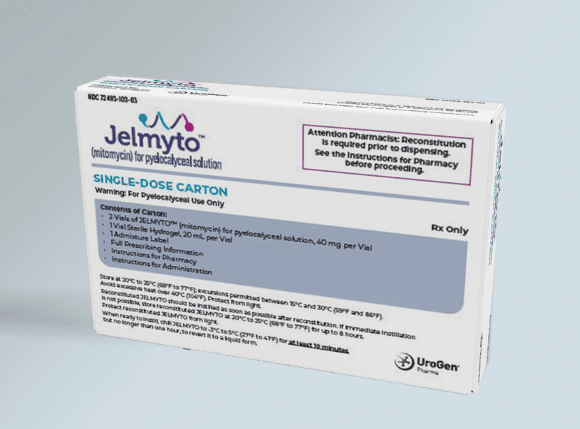Jelmyto Disease Interactions
There are 4 disease interactions with Jelmyto (mitomycin).
Antineoplastics (applies to Jelmyto) infections
Major Potential Hazard, High plausibility. Applicable conditions: Infection - Bacterial/Fungal/Protozoal/Viral
Because of their cytotoxic effects on rapidly proliferating tissues, antineoplastic agents frequently can, to varying extent, induce myelosuppression. The use of these drugs may be contraindicated in patients with known infectious diseases. All patients should be instructed to immediately report any signs or symptoms suggesting infection such as fever, sore throat, or local infection during antineoplastic therapy. Close clinical monitoring of hematopoietic function is recommended.
Mitomycin (applies to Jelmyto) bleeding disorders
Major Potential Hazard, High plausibility. Applicable conditions: Coagulation Defect
The use of mitomycin is contraindicated in patients with thrombocytopenia, coagulation disorders, or an increase in bleeding tendency. Mitomycin induces cumulative, delayed myelosuppression. Neutropenia and thrombocytopenia can occur anytime within eight weeks after initiation of therapy. Therapy with mitomycin should be withheld if platelet counts fall below 100,000/mm3 and subsequent dosages modified based on the nadir of the previous dose.
Mitomycin (applies to Jelmyto) myelosuppression
Major Potential Hazard, High plausibility. Applicable conditions: Bone Marrow Depression/Low Blood Counts, Fever
Mitomycin induces cumulative, delayed myelosuppression. Neutropenia and thrombocytopenia can occur anytime within eight weeks after initiation of therapy. Anemia occurs less frequently. Patients should be instructed to immediately report any signs or symptoms suggesting bone marrow suppression such as fever, sore throat, local infection, or bleeding. Close clinical monitoring of hematopoietic function is recommended. Therapy with mitomycin should be withheld if white blood cell counts fall below 4000/mm3 and/or platelet counts fall below 100,000/mm3 and subsequent dosages modified based on the nadir of the previous dose.
Mitomycin (applies to Jelmyto) renal dysfunction
Major Potential Hazard, High plausibility.
Elevations in BUN and/or serum creatinine have been reported during mitomycin therapy. Therapy with mitomycin should not be administered to patients with serum creatinine > 1.7 mg/dl. Hemolytic Uremic Syndrome (HUS) has been reported during mitomycin therapy. The incidence of HUS appears to be increased in patients receiving total doses of mitomycin > 60 mg. Blood product transfusion may exacerbate the symptoms of HUS. Clinical monitoring of renal function is recommended.
Switch to professional interaction data
Jelmyto drug interactions
There are 268 drug interactions with Jelmyto (mitomycin).
More about Jelmyto (mitomycin)
- Jelmyto consumer information
- Check interactions
- Compare alternatives
- Pricing & coupons
- Drug images
- Latest FDA alerts (1)
- Side effects
- Dosage information
- During pregnancy
- FDA approval history
- Drug class: antibiotics/antineoplastics
- En español
Related treatment guides
Drug Interaction Classification
| Highly clinically significant. Avoid combinations; the risk of the interaction outweighs the benefit. | |
| Moderately clinically significant. Usually avoid combinations; use it only under special circumstances. | |
| Minimally clinically significant. Minimize risk; assess risk and consider an alternative drug, take steps to circumvent the interaction risk and/or institute a monitoring plan. | |
| No interaction information available. |
See also:
Further information
Always consult your healthcare provider to ensure the information displayed on this page applies to your personal circumstances.


